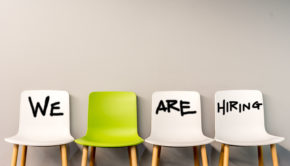The top deal breakers in an interview

Having the correct etiquette during an interview can mean the difference between receiving a call back or no call at all. Barry Whelan, MD of Excel Recruitment, outlines some pointers on what should be avoided during an interview
18 May 2015
Want to implode in an interview? Answer a call on your phone. One of the best ways to turn off an interviewer is not to have your phone turned off or at the very least turned to silent in an interview. Having it interrupt the interview by ringing is bad, checking a text message is worse and well answering it, that pretty much is game over.
So what else are the ‘deal breakers’ in an interview? What are the things a candidate can say or do that terminate the opportunity of employment there and then, the things that are likely to cause the interviewer to immediately discount that person from the interview process and ultimately consideration for a role?
1. Not being on time and not acknowledging it
Showing up for an interview late and in particular not acknowledging your lateness is a real issue. The interviewer will immediately feel you do not value their time. They will question your ability to follow instruction. Did you not understand the meeting was at a certain time? Could you not interpret that information?
2. Not being on time but acknowledging it
Not quite as bad as the first point, but still not acceptable. It is an interview and despite buses, trains or a Luas letting you down, terrible traffic and unforeseen circumstances, so what. You know where you have to be and when you have to be there, so get there on time no matter what.
3. Not turning your phone off during an interview
Turn your phone off and leave it out of site. A call coming in will distract you and derail the flow of the interview. It is rude and totally unnecessary. Checking your phone is not acceptable, it looks as if you are not interested in the interviewer or that you don’t respect their time. We would also suggest you keep it off while you are in reception. The interviewer may be reluctant to call you for your interview if they feel they are interrupting you on a call.
4. Not dressing for the interview
The fact of the matter is that people make decisions based on appearance. We all make assumptions based on how people look to us and form opinions on what we see. 20% of an interview is down to appearance. The interviewer will start to form their decision of your suitability for the role based on what they see and that is how you’re dressed. We would strongly advise professional attire for any interview even if you’re told it is ‘just a cup of coffee’ or a ‘chat’. We would also recommend covering tattoos. This is a safer option as you do not know the interviewer’s disposition towards these. Appearance is really important. We have had candidates fail in an interview because the top button of their shirt was undone and tie knot loosened.
5. Not bringing what you were asked to
Just to be professional, bringing a couple of hard copies of your CV to an interview is a good idea. If you were asked to bring a portfolio or samples of your work, then do. Bring your laptop if they are to be viewed online. If you have written references, then bring those too.
6. Blasting a former employer
I have seen this deal breaker on countless occasions. It is very tempting to say why your last employer was a bad employer or why the last company you worked for is rubbish. This is particularly so when you are trying to explain your reason for leaving, however, employers do not wish to hear this information. They question how you will communicate about them and their organisation in the future. Show diplomacy and try not to be too negative.
It is an interview and should be about positives.
7. Being distracted or under time constraints
Don’t look at your watch or a clock during the interview. It sends all the wrong signals to the interviewer that you don’t want to be there or that you need to be somewhere else. Keep eye contact and your concentration levels at 100%.
Interviewers expect you to put your best foot forward during an interview and if they see a sign of any unprofessional behaviour that they would certainly not tolerate in the workplace, they won’t tolerate it in an interview.



 Print
Print



Fans 0
Followers